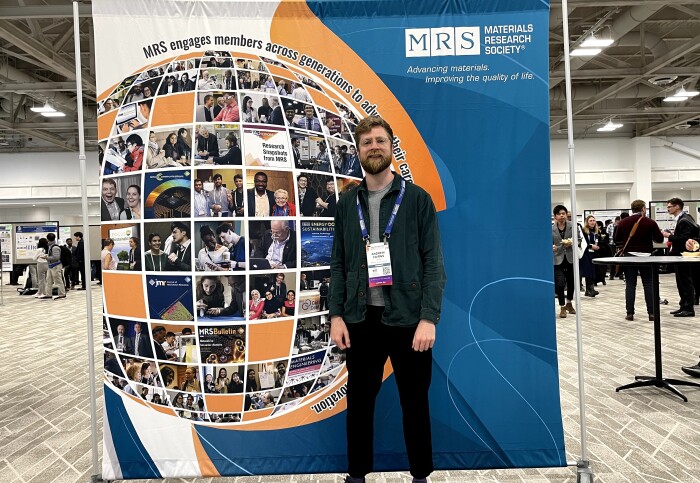Lecturer champions LGBTQ+ inclusion at Materials Research Society Conference

Dr Andrew Cairns has co-organised the first symposium championing the research from members of the LGBTQ+ community at the Spring 2024 MRS Meeting.
The Materials Research Society (MRS) meetings are the largest gatherings for materials science research. This spring, the conference was held from 22 - 26 April in Seattle, Washington.
The new LGBTQIA+ symposium highlighted the need to raise awareness and provide visibility for LGBTQ+ members of the materials science and engineering community, providing a platform to recognise the contributions of LGBTQ+ researchers to the discipline. This is the first time such a symposium has taken place at the MRS, but it follows similar successful broader impact sessions at the MRS and LGBT+ sessions at other learned society meetings.
Importance of recognising LGBTQIA+ in STEM
Recognising and celebrating LGBTQ+ staff and students in STEM is critical in promoting inclusivity and equality in materials science and engineering.
Findings have revealed that more than 40% of LGBTQ+ identifying researchers in STEM fields choose not to disclose their sexual identity
In the UK, research shows that 28% of LGBT+ respondents had at some point considered leaving their workplace because of the climate or discrimination. Nearly half of trans respondents had considered leaving their workplace because of the climate, with almost 20% of them thinking this often (Institute of Physics, Royal Society of Chemistry and Royal Astronomical Society, 2019).
In the USA, LGBTQ+ students are also found to have lower retention rates in four-year undergraduate courses compared to their peers (Hughes, 2018).
Moreover, differing social norms around the globe can induce feelings of isolation among researchers when travelling and collaborating internationally.
A new LGBTQIA+ symposium
The new symposium allowed all LGBTQIA+ scientists, from postgraduate researchers to professors, to present their research to a diverse audience supportive of their identity and scientific capacity.
"We had a unique atmosphere, with scientists sharing their work and personal stories, some for the first time. With such a variety of scientific topics in the symposium, everyone came away with new ideas and a network of champions and allies." Dr Andrew Cairns, Lecturer in the Department of Materials
Highlights included keynote speeches by various international researchers including Dr Clara Barker from The University of Oxford, a selection of poster presentations, a social hour and a roundtable discussion on improving LGBTQ+ inclusivity in Materials Science and Engineering.
Building an inclusive community is a key area of action, and in particular international networks bring LGBTQ+ scientists together, helping to alleviate isolation, exclusion and marginalisation (Institute of Physics, Royal Society of Chemistry and Royal Astronomical Society, 2019). The roundtable discussion highlighted the need for training and policies, how international bodies can work together and the need to support similar sessions for other minoritized groups.
Dr Andrew Cairns, Lecturer in the Department of Materials at Imperial College London, commented:
"To be involved in a pioneering session at a conference like the MRS was a privilege, and I want to thank all the speakers and co-organisers for their work.
We had a unique atmosphere, with scientists sharing their work and personal stories, some for the first time. With such a variety of scientific topics in the symposium, everyone came away with new ideas and a network of champions and allies."
Article text (excluding photos or graphics) © Imperial College London.
Photos and graphics subject to third party copyright used with permission or © Imperial College London.
Reporter
Dr Andrew Cairns
Department of Materials
Kayleigh Brewer
Department of Materials